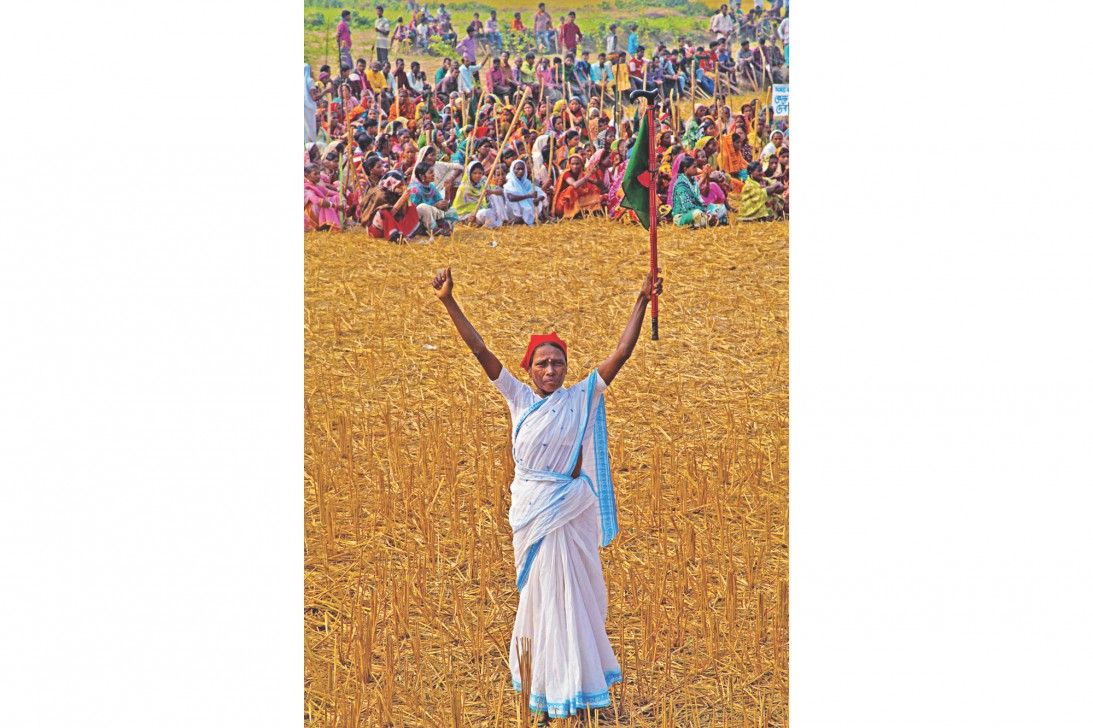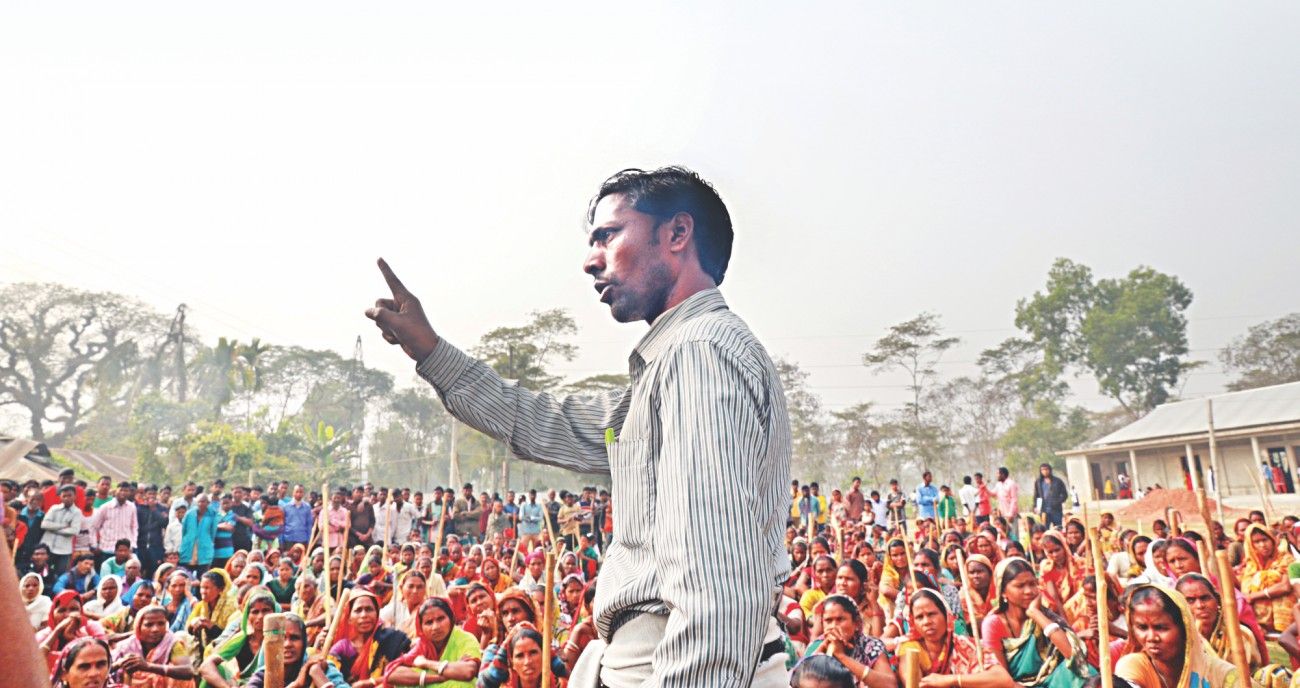(Bangladeshasf.org)
Tea workers say no to Economic Zones, demand economic development for the people and right to land for agriculture

Protestors draped in Bangladeshi flags and slogans like, “my land, my mother, I will not let you take it away from me,” showed the deep emotional and nationalist sentiments around the land.
In December 2015, tea workers from Chandpur and Begum Khan Tea Estates in Habiganj protested the threatened seizure of land they were cultivating to supplement their meagre wages by the Bangladesh Economic Zones Authority (BEZA). Their movement organised by the Chandpur Bhumi Rakkhya Committee (Chandhpur Land Protection Committee) comprised of tea workers, community activists and members of the tea worker union. BEZA is a centralised government agency whose stated purpose is to establish economic zones in all potential areas in Bangladesh including “backward and underdeveloped” regions with a view to encouraging rapid economic development. Prime Minister Sheikh Hasina is the chair of the governing board which sets the policy decisions for the agency.
In early July of 2019, we spent several days interviewing tea workers who were involved in the movement, local officials from the land office, officials from the Tea Board and representatives from BEZA. From these conversations, it was clear that while tea workers do not oppose development generally, they oppose the conversion of this agricultural land to an economic zone which their forebears have cultivated from the time of British colonialism. This land is important for their survival. The food grown is used for household use to improve their families’ nutritional intake and is also sold in the market to supplement their paltry dollar-a-day wages. Without this food and additional income, it is extremely difficult for workers to make a livelihood. Transforming a fertile food growing area into an industrial plot is contrary to ensuring food and nutritional security of the local community.
In contrast, local government land officials and BEZA see this land as a mode for industrial development. It was the local political elites and land officials that made the request to BEZA to consider the land for a special economic zone for industrial development. The industrial vision for economic zones ignores the potential role of farming and food production, contributing and constituting the foundation of balanced national development. Such an idea was also promoted by diasporic Bangladeshis in the UK who see industrialisation, not agriculture, as Bangladesh’s path forward. The need for a balanced development policy is still a far cry in the current official governmental policy of development.

Nripen Pal is part of the Executive Committee of the Tea Workers Union who participated in the movement.
What was clear from these stakeholders is that they share drastically different ideas of what economic development means and whom it should benefit. Local elites, BEZA, and diasporic Bangladeshis see economic zones as benefitting the economy of Bangladesh. Local political elites were cautious in their support because they knew that full support may mean the loss of votes. Tea workers see the continued cultivation of the land for agricultural use as the preferred course because it benefits the workers in the area and protects the environment. The tea plantation—Duncan Brothers—was a silent objector because the economic zones meant the loss of land that they leased from the government. They, however, were reluctant to take a public stand against the economic zone. So, the movement revealed a diverse set of stakeholders, some in tension, and with differing visions of what economic development means and interpretations on the workers’ rights to the land.
Workers and organisers including Shurjo Kumar argue that they have a right to the land because their forebears have cleared the land for tea cultivation and now cultivate the land for agriculture. Tea worker and leader, Ruma Urang, shares that even though her father was a freedom fighter, her family was never given the proper respect. The land, for her, holds a special significance of finally feeling part of Bangladesh. Protestors draped in Bangladeshi flags and slogans like, “my land, my mother, I will not let you take it away from me,” showed the deep emotional and nationalist sentiments around the land. The iconic picture of Sukuhara Karmokar portrays this well.
Adverse possession principles may support the workers’ claim to the land, which allows a person to acquire legal rights based on continuous possession of the land. Legally, the government owns the land. It leased it to Duncan Brothers, the tea plantation, and so an argument that the possession was without the permission of the owner would be difficult to establish. At most, as demonstrated in the slum dwellers case brought by BLAST, the government of Bangladesh must provide rehabilitation in the event of any eviction from government land, but this is not what the tea workers are demanding here. Moreover, under Bangladeshi land laws, the government is given wide discretion to use the land in the name of ‘public interest’. This is a legally undefined term in the existing laws and essentially refers to the executive order of development principle and therefore requires contestation and legal clarification. Any interpretation must take into account the views of the general population of Bangladesh through a participatory decision-making process.
By transferring the land to BEZA to create special economic zones, the government reasons that it is doing so in ‘public interest’. That interest is “economic development” and one that benefits the elites and foreign investors, and not the general public. From the local land officials up to the BEZA officials, the dominant view is that it is industrialisation that would bring about economic development.
However, tea workers may find legal support to their right to the land under the khas land settlement policy. Under this policy, the government of Bangladesh can transfer agricultural land to the landless poor. When I posed the possibility of giving the right to the land to the tea workers because they have cultivated it as well as that it should be given to Bangladeshis, not foreign investors, many laughed at my suggestion. Nevertheless, the purpose of this land policy is to alleviate poverty and to rectify past land policy issues that led to landless poor. Tea workers who have cultivated the land for tea and agricultural production are precisely the population the policy was intended to protect. Despite working in tea gardens for generations, they remain landless. Their right to live on the tea plantation is dependent on them working in the plantations. As such, they are unable to free themselves of this low paid work. Land ownership will help them have some economic autonomy. Because several families cultivate the land, a grant of the land to the tea workers can spark some innovations around cooperative land ownership that could be beneficial for the surrounding areas. Organisers from the committee have expressed interest in a cooperative mode of land ownership that can benefit more tea worker families.
Moreover, supporting agriculture also means that any new factories would not increase pollution. The principal scientific officer from the Bangladesh Tea Research Institute said that the area was drought prone and a factory can disturb the eco-system of the area. Representatives from the Tea Board shared that the placement of any factory or industry in the area could negatively impact the tea gardens and the local environment. According to the Bangladesh Tea Board data, in 2017, Bangladesh produced 79 million kilogrammes of tea against a consumption of nearly 86 million kilogrammes, which means our production does not meet our consumption. Any harm to the tea industry would mean we would have to import more tea to meet domestic demands. It seems counter-productive to convert a land to an industrial zone when such a decision would harm an existing thriving industry and impact the local environment. It is entirely possible to imagine economic development differently, one that supports workers, promotes agriculture, protects the environment, and sustains the thriving tea industry. Economic development need not mean giving up parcels of land for foreign investors.
Government promises for compensation or jobs in the economic zone was rejected as false promises. Tea workers have reason to be suspect of such promises. Community organiser, Mohan Rabidas, notes that previous promises for jobs in other economic development projects was given to tea workers but they were not followed. In particular, they point to the building of Sylhet International Cricket Stadium near Lakkatura tea garden where workers were promised jobs. While labourers were hired for the construction of the stadium, it did not translate to long term jobs. A decade earlier, workers and locals in the surrounding area remember the failure of Chevron/Unocal to keep promises for the development of gas fields. Land acquired by the government and transferred to Chevron was also met with protests and direct actions. Roads were blocked to stop construction. Landowners negotiated compensation, but other promises such as jobs, connection to gas supply, improved roads, schools, and hospitals were not provided. Instead, the gas field negatively impacted the land for farming and contributed to the shrinking of agricultural jobs.
These prior examples require us to carefully analyse who exactly benefits from the economic development that BEZA is promising. Is the acquisition of this land truly in public interest as the laws require? Should not the government be required to show whether a proposed zone would benefit the public and be required to make an environmental impact statement study?
Whatever our respective views of development may be, it seems consistent with democratic principles that there be a process by which the public can articulate their interests before decisions are made in their name. In fact, that is what the tea workers have asked. They want a meeting with Prime Minister Sheikh Hasina to explain why this land that they have cultivated should not be converted to an economic zone. As the head of BEZA, it is not an outlandish request. In fact, under BEZA law, there is no mechanism for the public to lodge their opposition to a land acquisition. When I suggested that I send a letter to the governing Board articulating the concerns raised by tea workers, I was told that there is no guarantee that my letter would be delivered. And so, I write this article in the hopes, as one of the tea workers sang, “Journalists, if you see Sheikh Hasina, tell her about the plight of tea workers.”
As of today, the land dispute is at an impasse. Observing the protests by the tea workers, BEZA has not taken further action to convert the land to a special economic zone, and has not expressed any immediate plans to do so. One of the executive board members of BEZA, who asked not to be named, indicated that since these lands are being promoted for foreign investment, it is not in their interest to promote land that may cause disruption from local stakeholders. When asked why, then, can’t they remove the land for consideration from economic zones, they hinted at tensions at the local level between political elites that favour a zone and tea workers who don’t. It is better to maintain this impasse by managing these conflicting local interests and adopt a wait and see approach if the tea workers change their demands.
Tea workers I interviewed chanted their slogan from 2015 that they will give their blood to the land of Bangladesh, before they allow an economic zone to be created. Four years later, their demand was still so strong that many workers questioned my motives for interviewing them. One worker, Montu Mia, said: first, tell me, are you for the zone? If you are, get out of here! You can tell that, for him, and many other workers, this movement was the culmination of generations of disregard and discrimination—and they were not going to allow the land they have cultivated to be taken away.
The tea workers’ movement against the seizure of land should not be viewed solely as an issue for tea workers. As I have shown, the movement revealed a core difference between the stake-holders. What does economic development mean and who should it benefit? It is not a movement against development. Tea workers’ movement answers the question in favour of development, but one that benefits the most vulnerable, and that protects Bangladeshis over the interests of foreign investors, political elites and even diasporic Bangladeshis. A whole array of contradictions, interests and contestation in development discourse is in play here. BASF think it is time we all should pay attention to create the opportunity for Mutual AiD and Direct Actions.

